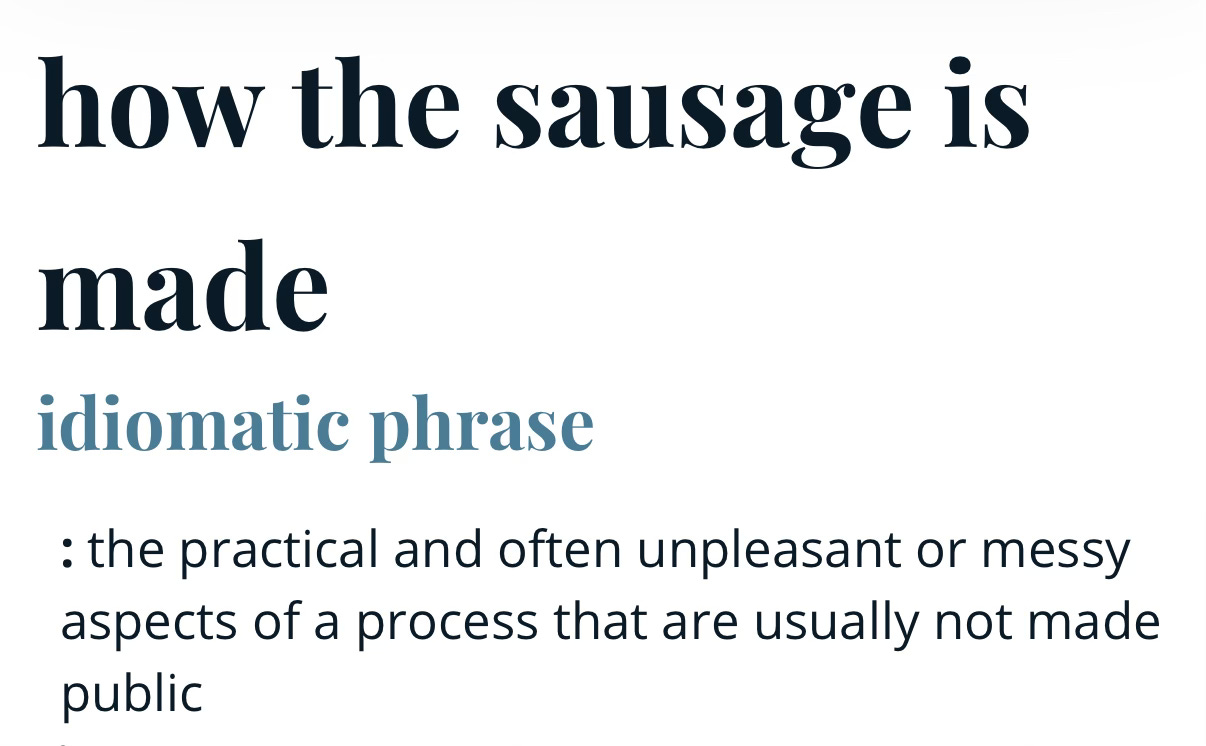How The Sausage Is Made: Insights from my two years on the CSP Council
By Jack Chew
The Chartered Society of Physiotherapy has an elected Council, so I ran for election in June 2022 and won in a ‘historic landslide’…which whilst strictly true was said by literally no one…because so few notice and/or care. Which is a problem I’ll come back to. I then sat on Council for two years and resigned quite dejectedly having realised that it was an enormous waste of my time and yours.
I’ll happily witter on about me me me in the coming paragraphs but let me first explain how it’s a waste of YOUR time. I have the bizarre but wonderful job of curating content by and for the MSK community. You share your feedback, offer suggestions, refine opinions and co-create articles, podcasts and webinars with us on a very regular basis, so I consider it an important part of my role to channel that energy productively.
Broken record alert, the entire mission of Physio Matters can be summed up as: raising MSK care standards. Whilst it has its limits we really try to think as much as we can as ‘the royal we’. Physio Matters has an engaged community of practice of around 32,000 people and whilst it would be daft to think we represent all or indeed any of you specifically, we really do try to understand the breadth of opinion in the sector. So one of the ways in which we can raise standards is to positively influence health policy and to drive up the quantity and quality of the MSK workforce. A large percentage of the UK MSK workforce are physiotherapists. I’m a physiotherapist by qualification, I pay my subs for my paper Chartership, so why not get in amongst it and see if I could positively affect change from within the CSP?
The timing also seemed good; I’d had to disband MSKReform [1], we were slowly climbing out of the pandemic, I’m a leader who doesn’t mind chaos and my well documented views on functional rehabilitation travel well across all physiotherapy disciplines…in theory. So in I went to the belly of the beast…became the fox in the henhouse…the cat amongst the pigeons…the skunk at the tea party.
Identifying which part of this story is interesting has been challenging and if you’re already nodding off then I do accept that I might have triaged poorly... If I was to write based on what preoccupied the organisation over my tenure, the two policy areas that absolutely dominated were the hot war in Gaza and the culture war on trans rights. Two understandable priorities for the Chartered Society of Physiotherapy… So I’m fleshing out two draft articles for later in the year that will hopefully be as interesting as their titles:
Physiotherapy’s Friends of Hamas
Physiotherapy’s Curious Interest in the Female Penis
Ever so slightly safer ground is today’s crux; how does the CSP make decisions? What’s the ugly truth about the process? What ingredients, what personnel, what expertise and what levels of consent contribute to calls on how money is spent, what angles are prioritised and what messages get promoted. I want to give you my take on How The Sausage Is Made.
The CSP has three primary functions; it is a trade union, a professional body and a mechanism through which collective insurance can be negotiated. Its CEO is supported by four directors to form an operational leadership team who manage 170 remote staff.
Members are represented by their trade union stewards, regional groups, country boards, professional networks, diversity networks and committees whose leadership are appointed. All of these groups inform the elected Council whose majority vote can make and adjust policy. Technically the organisation is therefore ‘member led’…in theory.
In reality, several things compromise this structure.
1. Corporate Strategy
Every five years the CSP forms a corporate strategy and the organisation works towards it. Sounds reasonable, however it is written by non-members in superficial consultation with long-gone Council members and manages to be vague enough to allow whatever agenda is politically convenient to be integrated and specific enough to lead to a ‘computer says no’ response if a Council suggestion is politically inconvenient.
2. Council Papers
CSP staff decide what to consult Council on and every few months at Council meetings several papers are presented for what is meant to be scrutiny. In what is a glorified nodding contest, recurring papers on crucial matters of state such as finance, risk and Gaza are accompanied by whatever work requires a rubber stamp according to the rules. A handful of options are suggested to Council and the item is ‘debated’. One glimmer of progress is that a handful of options is actually up from the norm of a singular recommendation from a few years ago.
3. Time
Council members are unpaid volunteers and only the Chair of Council has paid time to contribute in the lead up to and between meetings. Whilst this is not an inherent risk, this model is vulnerable to overwhelm of Council members, either accidentally through poor respect for their time or purposefully as a means of getting decisions through with minimal scrutiny.
4. Communications
People don’t care what you know until they know that you care. There is some great work being done by some great people at the CSP but it is not communicated effectively to the members due to an antiquated comms strategy that is a throwback to the 1990s. Back then it was feasible to ‘control the narrative’ or at least try to. The Alistair Campbell school of spin was yet to be challenged by the democratisation of opinion that social media brought us. Throughout my time on Council, the most consistent noise from us all was along the lines of ‘We need to communicate differently’ with a wealth of ideas as to what that would look like, most of which involved speaking more accurately and directly with members. Which were of course dismissed as naive and lacking the big brain genius of corporate comms specialists.
A council that is constrained by a naff corporate strategy, being presented cherry-picked papers with no time to deliberate thoroughly, that must communicate only through dated channels becomes simply a ratifying body.
Strategic decisions without resultant operational changes being done promptly are pointless. Amusingly, being consistently let down would be easier to swallow but time and time again strategic decisions that were deemed convenient were actioned swiftly and strategic decisions that were inconvenient were delayed. Usually long enough to vote on again to make sure Council came to the correct decision eventually!
Giving hyper-specific examples would be especially dull but a broad one that irked me to my last day was regarding fees. Council needs to decide on the following year’s membership fees in the October so is presented with an array of data including growth and churn trends, forecasting, pension liabilities etc. Much of this modelling is done by the Corporate Services and Infrastructure Directorate and the Financial Risk and Audit Committee (FRAC) who do a great job in their work and in their presentation of reasoning to Council. Let me quickly orientate you to time; I’m elected to a three-year term November 2022 to November 2025 and opted to resign in November 2024. So I was present but non-voting on the membership fees decision in 2022, then active for the following two decisions.
November 2022 - Council is presented with the news that FRAC recommends a membership fee increase and details the significant risks of not increasing fees. No cost reductions discussed.
Council votes to increase fees.
November 2023 - Council is presented with the news that FRAC recommends a membership fee increase and details the significant risks of not increasing fees. New Council rigorously critiques the fundamental operating practices of the organisation that leads to its costs being so high as to need such fee increases.
Council votes to increase fees.
November 2024 - Council is presented with the news that FRAC recommends a membership fee increase and details the significant risks of not increasing fees.
Council express dismay that the organisation has not made any changes to its fundamental operating practices and so of course this financial challenge was inevitable.
Council votes to increase fees.
The questions this should beg are ‘What governs the fundamental operating practices of the organisation?’ And ‘Who can change this?’
The CSP’s leadership team can’t help but say that they are simply delivering the corporate strategy signed off by Council, which has its associated running costs. In a corporate landscape in which people introduce themselves by the budget and number of staff under their control, expecting the CSP staff to reduce their budget and human resource is expecting turkeys to vote for Christmas. So instead they’re #JustFollowingOrders because #MemberLed.
As for who can change it, Council technically has the authority to. But expecting it to do it at all, never mind do it well, is WILD. Whilst it’s an imperfect analogy it is like expecting a set of inexperienced government ministers to radically adjust the scale, working practices and budgets of the entire civil service…unpaid…in their spare time.
In case I’m sounding like I’m playing a blame game, allow me to give a quick defence of the CSP’s leadership team. Specifically the way in which they handle Council and councillors. In an ideal world, the Council would be a revered body of members with high-end expertise including board level leadership. The two key selection pressures that would assist this are firstly it being considered an important, respected and influential role and secondly it being highly competitive with a wealth of candidates in a credible and thorough process.
Instead we get a paper exercise with just enough names on the ballot, who are then voted for based on a handful of bullet points by a similarly sized handful of members who bother. I ABSOLUTELY include myself in this by the way. It remains unclear to me how qualified I was to be on the CSP’s Council or whether my passion for the profession was enough when I admittedly lack passion for the organisation as it stands.
Many of my views have either tempered or hardened over these last six months as I have reflected on my time on Council. But there is something that I remain deeply conflicted on and no closer to a definitive take and that is what influence ‘Most Engaged Members’ should have on the organisation.
On one hand, it is eminently reasonable to respond to pressure from those giving more of their time to volunteer in CSP projects or causes. On the other hand, if the organisation isn’t in tune with the views of its wider membership, activists can be appeased to retain their engagement despite the risk that the hobby horse they’re riding that day might not be an issue that the wider membership would like to be prioritised.
If the CSP wants to have any street cred with the Trade Union Congress, then someone has to show up and wave a placard at a protest or seven. Similarly, if the CSP wants to position itself at the vanguard of EDI progress, then someone has to volunteer to wear a CSP logo at Pride parades and BLM marches. It would be unbelievably backward to isolate those with protected characteristics to advocate for themselves and therefore be left inevitably outnumbered, but I sense that better consensus building is required to help the membership feel united behind issues that can feel new and niche.
In my grappling with this issue I often imagine if those who are animated by professional standards and care quality had an ascendant voice in the organisation or a mechanism for influencing change internally. Would I then be off the fence and suggesting that we ‘most engaged members’ should be heard as a priority? I like to think not. I work hard to be morally consistent and feel confident that Physio Matters and its associated movement has a good track record against hypocrisy. Regardless of what the issue is, it is only right that members most passionate about it need to make a case to the membership as well as the Council. Providing mechanisms that encourage open, intra-professional dialogue must be a priority of any modern membership organisation, especially one as wealthy and historic as the CSP.
One thing I came to realise when observing various groups of members and their influence was that in many cases their being a physiotherapist was incidental to their cause. Some were trade union activists who happen to be physiotherapists and so as part of one of their external interests they furthered workers rights in solidarity with others in the wider trade union movement. Had they have been machinists, teachers or train drivers, their cause and rhetoric would be similar but they happen to be physiotherapists. And good on them by the way, I’m a working class lad from industrial Lancashire whose grandfather, father and sister worked as well-unionised mechanical engineers. But it begs the question how much influence they should have over the organisation writ large as a chartered society with other directorates?
Some were EDI activists who happen to be physiotherapists and so as part of one of their external interests, they furthered LGBT/BAME/disability rights in solidarity with others in the wider EDI movements. Had they have been machinists, teachers or train drivers, their cause and rhetoric would be similar but they happen to be physiotherapists. And good on them by the way, I too recognise the merit in having a workforce that optimally reflects the population we serve.But it begs the question how much influence they should have over the organisation writ large as a chartered society with other directorates and roles.
As aforementioned, I’m conflicted! Help me off the fence!
I have ample suggestions as to how to put some of this right but that’s for another piece if there’s interest. Promisingly, even whispers of this sausage-centric diagnostic piece being written led to some productive conversations with the top brass.
It will be very interesting to see if we can improve the transparency of how the sausage is made at the CSP as well as improving the quality of the ingredients.
I wait with bated breath and poised tastebuds.
References
[1] The Rise and Fall of MSKReform, Felicity Thow, MSKMag Issue 15, March 2024 https://open.substack.com/pub/mskmag/p/the-rise-and-fall-of-mskreform?r=7o7jm&utm_campaign=post&utm_medium=web&showWelcomeOnShare=false










Sounds like our APA in Australia.
Advocacy and Political stances mostly.
And the advocacy isn't working, we've just had funding cut from our National Disability Insurance Scheme.